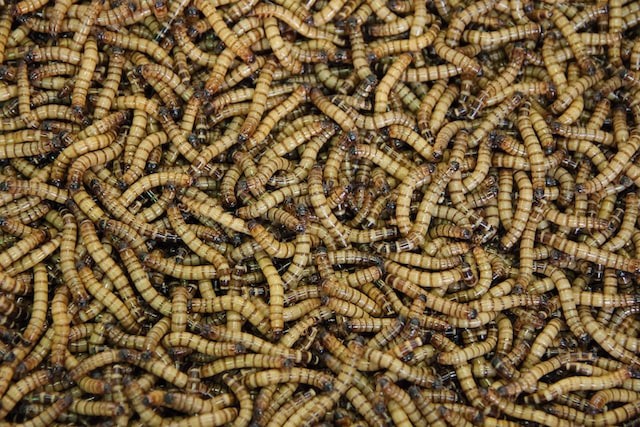Traditional diets are under pressure from changing food ideologies, and not just for humans. The menus for our pets are also expanding to include creative food options.

Innovative Ways
Entrepreneurs have come up with many innovative ways to satisfy their cravings. For instance, Bella and Duke in the UK offer raw food diets for pets, while Buddy Pet Foods in Sweden offers natural dry food, and Barkyn in Portugal customizes pet food.
Insects are a more cutting-edge treat that our animal pals might try if none of those foods appeal to them.
Lofty Goals
That is what the Estonia-based firm FlyFeed has on the stove. The business has created an automated farming system that produces animal feed from fly larvae.
The idea for FlyFeed, founded in 2021 by Arseniy Olkhovskiy, came from a study on malnutrition. He concluded that insect farming could offer a cost-effective and long-term solution to the protein problem. But he intends to approach animals first, then people.
It's difficult in human food right now because people don't want to consume anything related to insects, but Olkhovskiy told TNW that it's evident in animal feed.
The 24-year-old rattles off a long list of advantages of raising insects, including how they can be fed recycled waste that would otherwise rot in landfills, grow up to 100 times more quickly than traditional animal food sources, are packed with high-quality nutrients, have low production costs, and use a lot less environmental resources than conventional agriculture.
Olkhovskiy affirms that they are also quite tasty for animals. He claims that his cat enjoys the flavors.
Supplying Insect-Based Products
The company FlyFeed is one of many to use insects as pet food. Although Jiminy's in the USA manufactures protein from crickets, insect in France has spent more than ten years creating mealworm components. Black army flies are another insect that FlyFeed uses.
There are various draws for this species. The larvae may transform organic waste into fertilizer and edible protein for animals. Also, they have a quick growth rate, are rich in numerous nutrients, are suited for wet food, and don't spread infections.
The insects will be raised on agricultural waste in vertically stacked boxes, which purportedly take up 100 times less room than raising soybeans or livestock. To optimize circumstances, the facility will also use computer vision to track larvae development and data-driven climate control.
The farm's protein will be used in the foods. The product's first commercial batch will be delivered by FlyFeed early in the following year. The company hopes to produce 17,500 tonnes of insect products from 40,000 tonnes of garbage annually. The products will be divided into fertilizers, fats, and proteins.
If all goes according to plan, the early produce will serve as a bridge to human consumption.
Future Goals
Olkhovskiy remarked, "We need to scale it first. In addition to bringing it to places where people truly need it, we must make it more affordable and of standardized quality.
Olkhovskiy claims that other insect-farming start-ups have needed help selling their products to people. Instead, he has decided to concentrate on the operational and technological difficulties. Olkhovskiy intends to distribute the food in nations where malnutrition is most critical once they have been overcome. He anticipates that a cheap price point will promote adoption. He claims that a kilo of protein from low-cost chicken broilers costs $4, whereas a kilo from FlyFeed costs less than $2.
Related Article : Plant Based Meat Alternatives Can Dent Conventional Meat Market by 2025
For more news update about alternative lifestyle and the environment, don't forget to follow Nature World News
© 2025 NatureWorldNews.com All rights reserved. Do not reproduce without permission.





